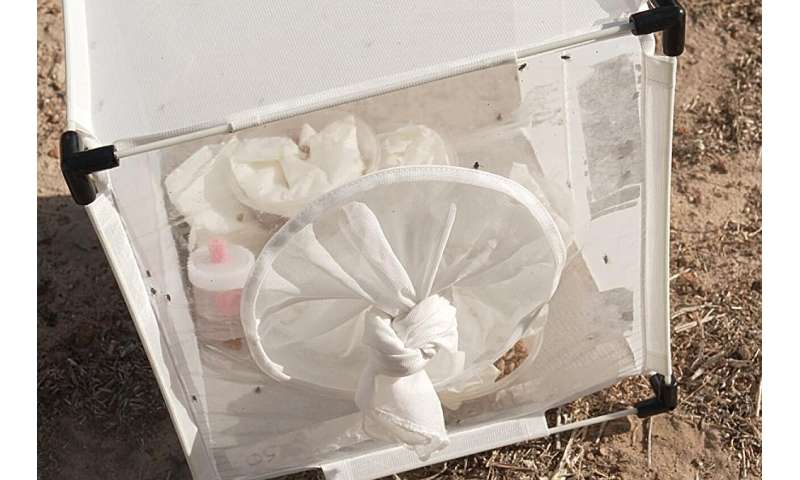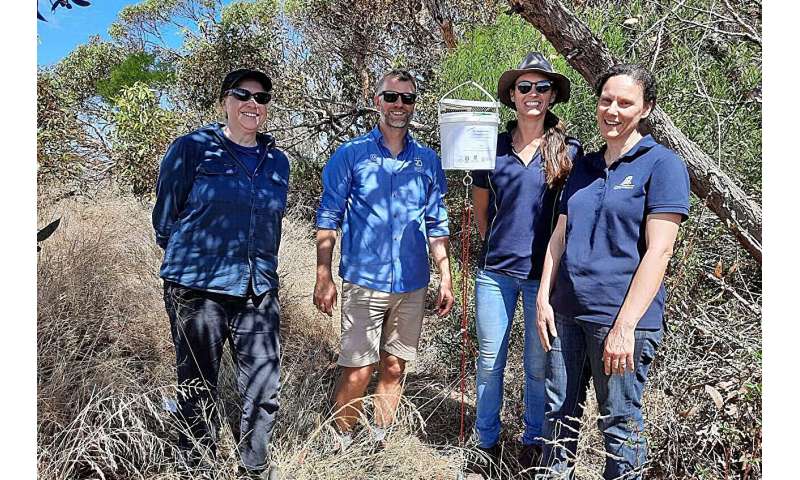Release of parasitoid flies to help control snail pests and protect crops in Australia

A biocontrol program has commenced on the South Coast, where Australian-bred parasitoid flies have been released to help control snail pests and protect crop yields, quality and growers' profitability.
The flesh fly (Sarcophaga villeneuveana), originally introduced as a biocontrol agent from France, only targets the grains pests pointed snail (Cochlicella acuta) and small pointed snail (Cochlicella barbara).
The biocontrol program, part of a larger four-year project by the South Australian Research and Development Institute (SARDI) and the University of Adelaide, is an investment of the Grains Research and Development Corporation (GRDC).
The Department of Primary Industries and Regional Development (DPIRD) has joined forces with Stirlings to Coast Farmers, South East Premium Wheat Growers Association and SARDI to release the flies for the first time in Western Australia.
The fly was cleared for release in Australia as a biocontrol agent 20 years ago.
In the early 2000s, populations of the fly sourced near Montpellier in France were mass-reared and released by SARDI and CSIRO on South Australia's Yorke Peninsula, where it has since established and spread.
In recent years, parasitism levels of more than 30%–40% have been observed in localized areas of suitable habitat.
Snail damage to grain crops has increased over the past decade in coastal and high rainfall areas, which is estimated to cost the WA grains industry more than $6 million dollars per annum in lost production and control costs.
DPIRD research scientist Svetlana Micic said biocontrol could provide an additional option to suppress snail populations, alongside baiting and strategic paddock management.
"The female flies attack conical snails by laying a live larva on the outside of the shell of a resting snail, which crawls inside and consumes the host, and then emerges as an adult fly," she said.

"There can be five, six or more generations of flies attacking snails throughout the spring and summer.
"About 1,000 flies, reared at SARDI's laboratories in Adelaide, were released during the week at sites in the South Stirlings, Woogenellup and Esperance districts.
"Additional releases will be performed over time to boost numbers and maximize the chances of the fly establishing successfully.
"It will take some time for the flies to establish. Over the next couple of seasons, we will perform more releases, together with SARDI, and then monitor release sites for establishment success and the potential to extend the program to other parts of the WA Grainbelt.
"While biocontrol is not a silver bullet, it could prove to be a useful tool for growers with high snail populations."
The trial builds on GRDC research led by the CSIRO and SARDI to investigate factors affecting fly parasitism of pest snails on South Australia's Yorke Peninsula.
SARDI Entomology and University of Adelaide project leader Dr. Kym Perry said the biocontrol program formed part of a multi-faceted effort to improve snail management outcomes for grain growers nationally, through significant investment support from GRDC and the SA Grain Industry Trust.
"Conical snails are a particularly difficult management challenge for Australian grain growers, due to their small size, cryptic behavior and potential to reach large numbers," Dr. Perry said.
"Biocontrol is a longer-term prospect that, once established, can help to provide partial suppression of conical snail populations free to growers as part of a larger integrated management program.
"The goal of these initial fly releases in WA is to establish local populations of parasitoid flies in the state, which can spread naturally across snail affected areas over time and, ultimately, become another tool in the management toolbox.
"It's fantastic to be working together with DPIRD and farming groups Stirlings to Coast Farmers and SEPWA to provide more tools for snail management in the West."
Provided by University of Adelaide